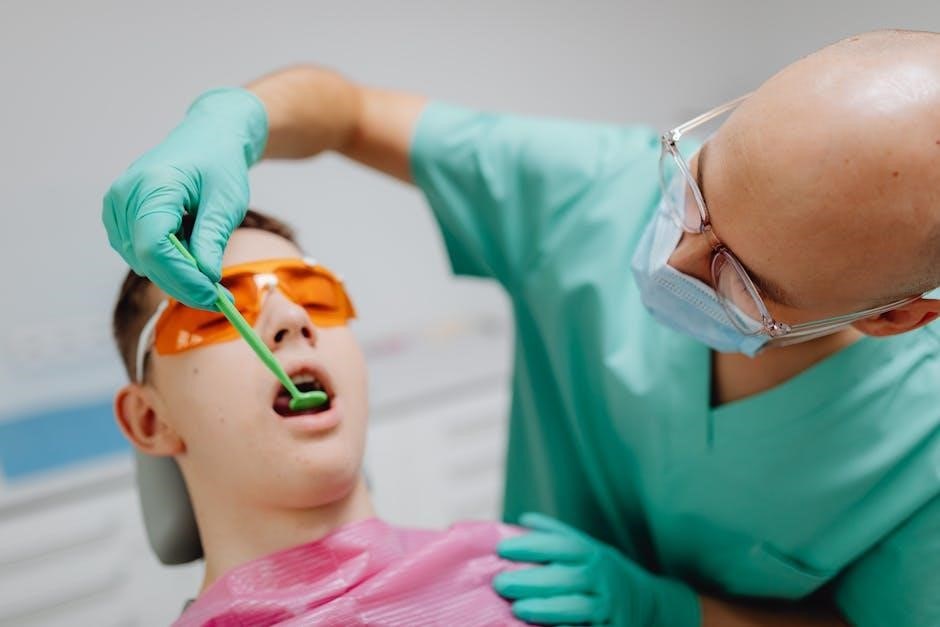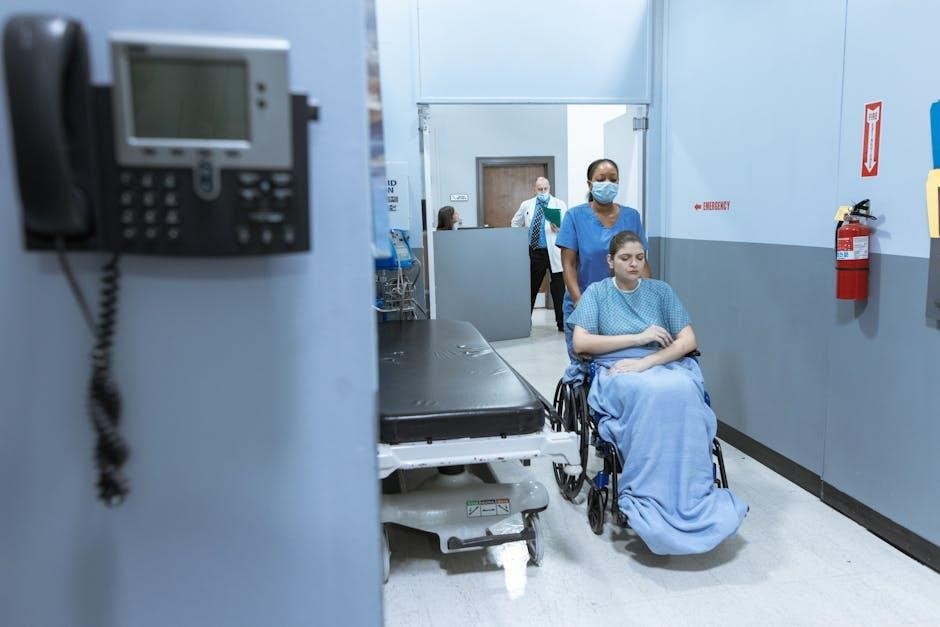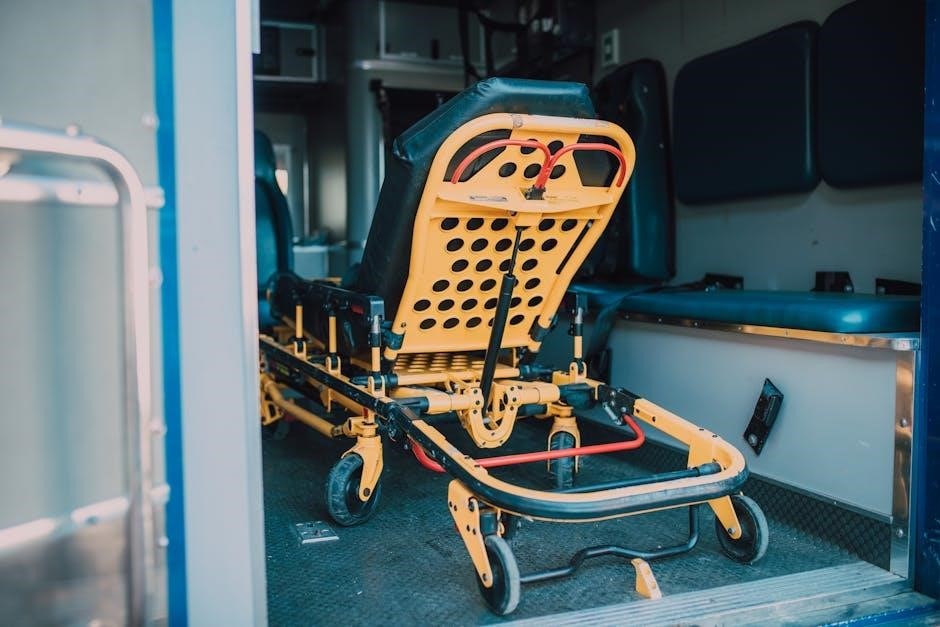A well-crafted medical assistant cover letter is essential for making a strong first impression, highlighting your skills, experiences, and passion for patient care in a concise manner.
Importance of a Cover Letter in Healthcare Jobs
A cover letter is a critical tool for healthcare professionals, bridging the gap between your resume and the employer. In a competitive field like medical assisting, it highlights your skills, experiences, and dedication to patient care, setting you apart from other applicants and showcasing your unique qualities to potential employers effectively.
Overview of Medical Assistant Roles and Responsibilities
Medical assistants play a dual role, handling both clinical and administrative tasks. They take vital signs, prepare patients for exams, and assist with procedures. Administratively, they manage records, schedule appointments, and handle billing. Strong communication and compassion are essential, as they serve as a vital link between patients and healthcare providers, ensuring efficient and patient-centered care.

Structure of a Medical Assistant Cover Letter
A medical assistant cover letter should include contact information, a greeting, an opening paragraph introducing yourself, body paragraphs highlighting skills and experiences, and a closing paragraph expressing gratitude and next steps.
Contact Information and Greeting
Your cover letter should begin with your contact information, including your name, address, phone number, and email, followed by the date and the employer’s details. End with a formal greeting, such as “Dear Hiring Manager” or the hiring manager’s name if known, to establish professionalism and clarity from the start.
Opening Paragraph: Introducing Yourself and Interest
Body Paragraphs: Highlighting Skills and Experiences
Detail your clinical and administrative skills, such as taking vital signs, preparing exam rooms, and managing patient records. Highlight specific experiences, like assisting with procedures or improving office efficiency. Showcase your ability to multitask, communicate effectively, and provide compassionate care, aligning your expertise with the employer’s needs and enhancing patient outcomes.
Closing Paragraph: Expressing Gratitude and Next Steps
Thank the hiring manager for considering your application and express enthusiasm for the opportunity. Reaffirm your confidence in contributing to their team. Mention your availability for an interview and offer to provide additional information. Close with a polite sign-off, such as “Sincerely,” followed by your name, ensuring a professional and personable tone throughout.
Key Sections to Include in Your Cover Letter
Include a professional summary, relevant experience, education, and personal attributes to create a comprehensive and compelling cover letter that highlights your qualifications and fit for the role.
Professional Summary: A Brief Overview of Your Qualifications
A professional summary succinctly highlights your experience, skills, and certifications, showcasing your ability to excel as a medical assistant. Emphasize your proficiency in patient care, clinical procedures, and administrative tasks, while tailoring your qualifications to align with the job requirements and demonstrate your readiness to contribute effectively.
Relevant Experience: Clinical and Administrative Skills
Highlight your clinical expertise in patient care, vital signs, and medical procedures, along with administrative proficiency in scheduling, billing, and record-keeping. Emphasize your ability to manage both roles efficiently, ensuring seamless patient flow and accurate documentation. Tailor your experience to align with the job description, demonstrating your versatility in a fast-paced healthcare environment.
Education and Certifications: Highlighting Your Training
Detail your medical assistant education, including diplomas or degrees from accredited programs. Mention certifications like Certified Medical Assistant (CMA) or Registered Medical Assistant (RMA), and any specialized training in areas such as phlebotomy or EKGs. Align your educational background with the job requirements, showcasing your readiness to contribute effectively in a clinical setting.
Personal Attributes: Compassion, Attention to Detail, and Teamwork
Highlight your compassionate nature, essential for patient-centered care. Emphasize your attention to detail in clinical tasks and administrative work. Showcase your ability to collaborate as part of a healthcare team, demonstrating strong interpersonal skills and a commitment to supporting both patients and colleagues in a fast-paced environment.
Skills to Emphasize in a Medical Assistant Cover Letter
Highlight clinical and administrative skills, such as patient care, vital sign measurement, and record-keeping. Emphasize communication, attention to detail, and teamwork to demonstrate your versatility and effectiveness in healthcare settings.
Clinical Skills: Patient Care, Vital Signs, and Medical Procedures
Emphasize your ability to provide exceptional patient care, accurately measure vital signs, and assist with medical procedures. Highlight proficiency in preparing patients for exams, administering medications, and maintaining sterile environments. Showcase your hands-on experience in clinical settings to demonstrate your readiness to support healthcare teams effectively.
Administrative Skills: Scheduling, Billing, and Record-Keeping
Demonstrate proficiency in scheduling appointments, managing billing processes, and maintaining accurate patient records. Highlight your ability to efficiently organize workflows, ensure compliance with regulations, and handle electronic health records. Showcase your attention to detail and organizational skills, which are critical for streamlining administrative tasks in a fast-paced healthcare environment.
Soft Skills: Communication, Interpersonal Relations, and Time Management
Highlight your ability to communicate effectively with patients, healthcare teams, and families. Emphasize strong interpersonal skills for building rapport and providing compassionate care. Showcase time management abilities to prioritize tasks, ensuring efficient workflow in a dynamic healthcare environment. These soft skills are essential for delivering exceptional patient care and maintaining a collaborative workplace culture.

Types of Medical Assistant Cover Letters
Types of Medical Assistant cover letters include entry-level, experienced, geriatric, pediatric, and specialized examples, each tailored to specific roles and available in PDF formats.
Entry-Level Medical Assistant Cover Letter Example
An entry-level medical assistant cover letter should highlight your education, training, and enthusiasm for the role. Emphasize your understanding of clinical and administrative duties, even with limited experience. Showcase your passion for patient care and willingness to learn. Use a professional tone and ensure your letter is tailored to the job description, available as a PDF template.
Experienced Medical Assistant Cover Letter Example
An experienced medical assistant cover letter should highlight your clinical and administrative skills, such as patient care, vital sign collection, and electronic health records. Showcase specific achievements, certifications, and longevity in the field. Tailor the letter to the job description, emphasizing your ability to work efficiently in fast-paced environments and your commitment to quality patient care, available as a PDF.
Tips for Writing an Effective Medical Assistant Cover Letter
Focus on clarity and conciseness, ensuring your PDF cover letter highlights relevant skills, experiences, and certifications. Avoid generic content and tailor each letter to the specific job description.
Customization: Tailoring Your Letter to the Specific Job
Customizing your cover letter is crucial for standing out. Use job-specific details from the description to mirror language and highlight relevant skills. Show genuine interest by addressing the facility’s mission or unique aspects of the role. Avoid generic statements and ensure each letter reflects the specific needs and culture of the workplace.
Using Keywords from the Job Description
Incorporating keywords from the job description enhances your cover letter’s relevance. Identify terms like “patient care,” “scheduling,” or “Electronic Health Records (EHR)” and naturally integrate them. This ensures your letter aligns with the employer’s priorities, making it more likely to pass through Applicant Tracking Systems (ATS) and catch the hiring manager’s attention.
Maintaining a Professional yet Personable Tone
Striking the right tone is crucial. Be professional by avoiding overly casual language or jargon, while still showcasing your personality. Express genuine enthusiasm for the role and highlight how your skills align with the practice’s values. This balance helps you connect with hiring managers and demonstrates your fit for the position.

Common Mistakes to Avoid in a Cover Letter
Avoid generic content, grammatical errors, and overly long paragraphs. Ensure your cover letter is tailored, concise, and error-free to make a professional impression and stand out.
Generic or Template-Based Letters
Using generic or template-based letters can make your application seem impersonal and lacking effort. Hiring managers value customization, as it shows genuine interest in the role. Avoid using identical content for every job; instead, tailor your letter to highlight relevant skills and experiences specific to the position and healthcare setting.
Grammatical Errors and Typos
Grammatical errors and typos in a cover letter can undermine professionalism and attention to detail, crucial traits for medical assistants. Always proofread your letter multiple times or have someone else review it to ensure accuracy and polish, as mistakes can create a negative impression and harm your chances of being hired.
Overly Long or Wordy Paragraphs
Overly long paragraphs can make your cover letter appear cluttered and difficult to read. Keep your writing concise and focused, ensuring each paragraph addresses a single key point, such as clinical skills or administrative experience. This clarity will make your application more professional and easier for hiring managers to review.
Formatting Your Medical Assistant Cover Letter as a PDF
Formatting your cover letter as a PDF ensures professional presentation and consistency across all devices, making it a preferred choice for healthcare employers seeking polished applications.
Why PDF is the Preferred Format for Cover Letters
PDF is the preferred format for cover letters due to its professional presentation, consistency across devices, and inability to be altered once saved, ensuring your application appears polished and secure to potential employers.
Designing a Clean and Professional Layout
A clean layout enhances readability and professionalism. Use simple fonts, consistent spacing, and clear sections for contact info, greeting, body, and closing. Incorporate bullet points for skills and experiences, ensuring proper margins and alignment. A well-organized design ensures your cover letter is visually appealing and easy to follow, making a positive impression on employers.
Ensuring Compatibility Across Devices
Saving your cover letter as a PDF ensures compatibility across devices, maintaining its layout and formatting. This guarantees your document appears professional and consistent, whether viewed on a computer, tablet, or smartphone. Employers appreciate this universal accessibility, as it reflects attention to detail and modern professionalism in your application materials.

Examples of Successful Medical Assistant Cover Letters
View samples of effective medical assistant cover letters, including geriatric, pediatric, and specialized roles, to see how professionals tailor their PDF documents for impactful presentations.
Geriatric Medical Assistant Cover Letter Example
Dear Hiring Manager,
I am excited to apply for the Geriatric Medical Assistant position at [Medical Facility]. With [X years] of experience in elder care, I specialize in vital signs, medical procedures, and patient education. My compassion and dedication to improving quality of life for seniors make me an ideal fit for your team.
Sincerely,
[Your Name]
Pediatric Medical Assistant Cover Letter Example
Dear Hiring Manager,
I am eager to apply for the Pediatric Medical Assistant role at [Medical Facility]. With experience in administering vaccinations, measuring vital signs, and preparing children for exams, I am skilled in creating a comforting environment for young patients. My passion for pediatric care and attention to detail make me a strong candidate for your team.
Sincerely,
[Your Name]
Specialized Medical Assistant Cover Letter Example
Dear Hiring Manager,
I am excited to apply for the Specialized Medical Assistant position at [Medical Facility]. With expertise in [specific area, e.g., cardiology or dermatology], I bring proficiency in advanced procedures, EHR systems, and patient communication. My adaptability and passion for delivering precise care make me an ideal fit for your specialized team.
Sincerely,
[Your Name]
Final Tips for Submitting Your Cover Letter
Proofread meticulously, ensure compatibility across devices, and submit as a PDF to maintain professionalism. Timely applications and strict adherence to instructions enhance your chances of securing an interview.
Proofreading and Editing Before Submission
Thoroughly proofread your cover letter to eliminate grammatical errors, typos, and clarity issues. Ensure all contact details and dates are accurate. Consider having a trusted colleague or mentor review it for feedback. A polished, error-free document reflects professionalism and attention to detail, essential for making a positive impression on hiring managers.
Following Application Instructions Carefully
Always adhere to the employer’s submission guidelines, such as formatting preferences or required documents. Ensure your cover letter is in PDF format if specified, and verify any page or word limits. Tailoring your submission to meet their expectations demonstrates professionalism and attentiveness, increasing your chances of a positive review.
Timing Your Application for Maximum Impact
Submit your application at the right time to stand out. Apply early in the hiring process to make a strong impression. Consider timing your submission during slower periods, such as mid-morning, when hiring managers may have more time to review applications thoroughly. This strategy can enhance your chances of being noticed.
A well-crafted cover letter is key to standing out in your medical assistant application. Highlight your skills, experiences, and passion for patient care to make a lasting impression.
Recap of Key Elements for Success
A winning medical assistant cover letter should be tailored to the job, highlight clinical and administrative skills, showcase compassion, and maintain professionalism. Use keywords, avoid errors, and ensure clarity. Keep it concise, personalized, and free of generic content to stand out and demonstrate your commitment to patient care and teamwork.
Final Thoughts on Standing Out in Your Application
To stand out, ensure your medical assistant cover letter is tailored, highlighting your unique skills and passion for patient care. Maintain a professional tone, avoid clichés, and proofread thoroughly. Showcasing genuine enthusiasm and alignment with the employer’s values will leave a lasting impression and increase your chances of securing an interview.

No Responses